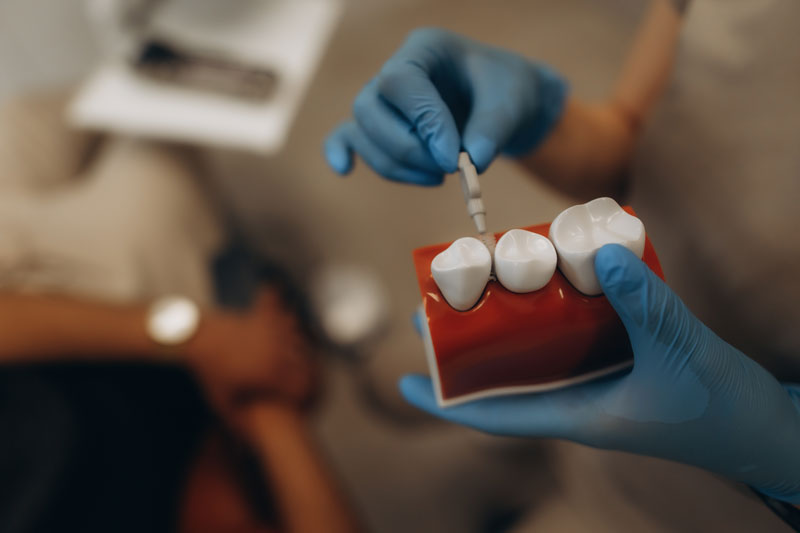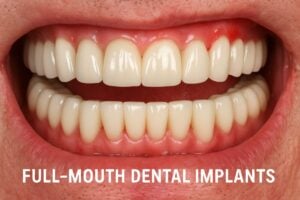Is mandibular implant surgery in Louisville right for you? Short answer: maybe. If you have missing or failing lower teeth, loose lower dentures, or trouble chewing and want a long-term solution, this procedure could help. This article explains what mandibular implant surgery is, who makes a good candidate, what the procedure and recovery look like, alternatives and costs, and how to take the next step toward care.
What is mandibular implant surgery?
Mandibular implant surgery means placing dental implants into the lower jaw (the mandible) to replace missing lower teeth or to anchor dentures. It differs from single-tooth implants because the goal is often to restore a whole lower arch or to stabilize a removable denture. Common goals include restoring chewing function, improving speech, preventing bone loss, and giving a more natural, secure fit than traditional dentures.
Who is a good candidate for mandibular implant surgery?
Bone and oral health
Good candidates generally need enough jawbone to hold implants. Years of missing teeth or long-term denture wear can shrink bone, which may require bone grafting before implants. A CBCT scan helps measure bone volume and shape and guides whether grafting or other preparatory steps are needed.
Medical and lifestyle factors
Chronic conditions and habits affect success. Well-controlled diabetes usually is okay, but uncontrolled diabetes raises infection risk. Smoking slows healing and lowers implant success rates. Certain medications, like some blood thinners or osteoporosis drugs, need careful planning with your dentist and physician. Your provider will review medical history, meds, and habits when evaluating you.
Functional and cosmetic goals
If you want a stable lower row of teeth that feels and functions like natural teeth, mandibular implant surgery may be recommended over removable dentures or bridges. Implants are favored when long-term chewing strength, improved facial support, and reduced bone loss are priorities. For some patients with temporary health limits or low budget, removable options may be preferable short term.
What to expect during and after mandibular implant surgery
Diagnosis and planning
Planning starts with a clinical exam and 3D imaging. A CBCT scan and digital intraoral scans show bone level, nerve locations, and tooth positions. These tools let the team plan implant size, angle, and placement precisely, and to design surgical guides or temporary teeth when appropriate.
The procedure and anesthesia options
The procedure usually follows these steps:
- Local anesthesia or conscious sedation for comfort; IV sedation is an option for more complex cases.
- Placement of one or more implants into the lower jaw. For full-arch support, several implants may be used.
- Attachment of a temporary prosthesis same day in some cases, or healing first before final restoration.
Having an on-site lab and a sedation-capable surgical suite can shorten treatment time and allow same-day restorations when appropriate, reducing the number of office visits.
Recovery, risks, and long-term care
Expect swelling, mild pain, and some bruising for a few days. Most people return to normal light activity in 48–72 hours and full function as healing completes. Implants fuse with bone over several months. Watch for signs of complications like persistent pain, swelling that worsens, fever, or loose implants and contact your dentist promptly.
Long-term care includes good oral hygiene, regular dental checkups, and avoiding tobacco. With proper care, implants often last many years to decades.
Alternatives, costs, and next steps
Alternatives include removable dentures and fixed bridges. Dentures are less expensive initially but may move, need relines, and contribute to bone loss. Bridges can work when adjacent teeth are healthy but require altering those teeth and are not ideal for long spans or severe bone loss.
Costs vary widely based on the number of implants, bone grafting needs, materials, and whether same-day restorations are provided. Many offices offer financing or payment plans to spread cost. The best next step is a consult with imaging so you get a clear estimate and a personalized plan.
Why consider Harmon Dental Center for mandibular implant surgery
- Dr. Bradley Harmon: DDS with honors, advanced training, and memberships in major dental and implant organizations.
- Advanced in-office technology: on-site implant lab, CBCT 3D imaging, Primescan intraoral scanner, chairside milling, in-house 3D printing, and a sedation-capable surgical suite for same-day restorations.
How to learn if mandibular implant surgery is right for you
Schedule a consult for a personalized evaluation, CBCT imaging, and a clear treatment plan. A short visit can show whether mandibular implant surgery in Louisville fits your needs and budget and what steps—if any—are needed first. Call or book online to discuss your goals and get a tailored recommendation.






